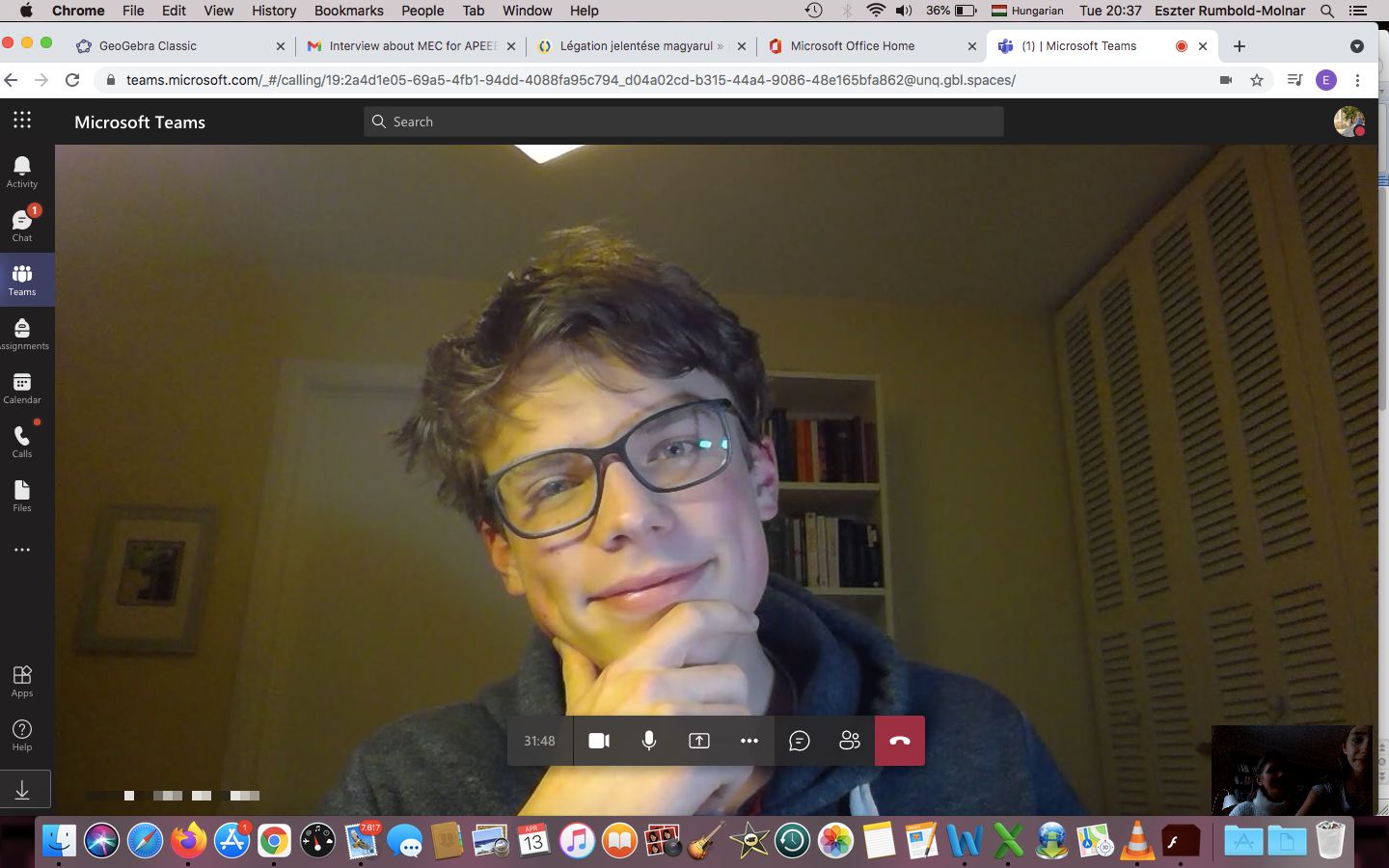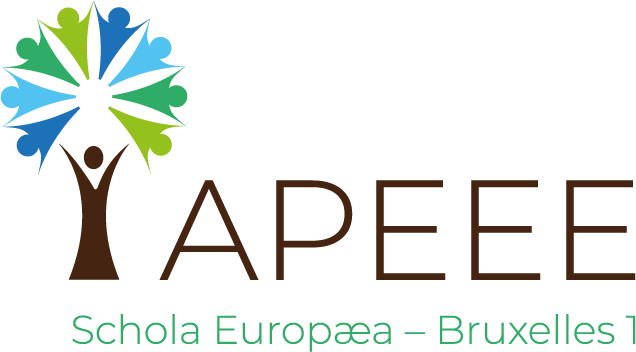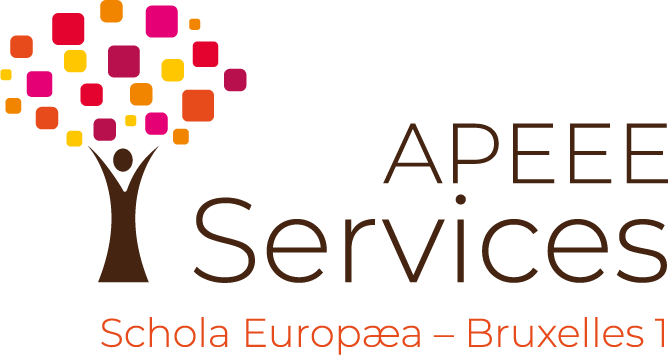Interview with EEB1’s MEC 2021 delegation member, S5 student Robin von Breska

The Model European Council (MEC) is a complex simulation, a role-playing exercise that Secondary school students of all the European Schools have taken part in every year since the 1980s. Between 15 and 19 March 2021 EEBI hosted the one-week event online.
We asked Robin von Breska, S5DE student member of the EEBI delegation and one of the two CoSup representatives of the EEB1 students, to tell us about his first-hand experience of the debates, as well as about what he brings home from this traditional event including all European Schools. Interview – via Zoom – by APEEE NewsFlash Reporter parent Eszter Rumbold-Molnár.
Can you tell us what the Model European Council, or MEC, is all about?
It is a project that tries to simulate how the European Council, including the meetings of the Council of the European Union, works. So where Charles Michel sits with all the Heads of State and Government at the moment, and where all the ministers sit in the different Councils.
And there is this special aspect that it is all the European Schools that take part in it every year.
How should we imagine the role of the European Schools?
Students from all the European Schools participate, which means the 13 full-fledged schools plus the two accredited ones. Each European School sends a delegation of their Secondary students, – mainly S6-S7 and in some cases S4-S5 students – with each school representing normally two countries of the EU.
All the EU member states are in this way represented, the school hosting the event that year providing the rotating EU Presidency as well as the Commission (because there is always a representative of the European Commission in the Council meetings).
Two of the schools’ delegations consist of “journalists” who prepare articles and compile the MEC’s two newspapers.
How does the Model European Council work?
The European Schools’ delegations’ members play the roles of the leaders and the ministers at the Councils’ meetings. There are usually different topics covered every year, this year the European Council was covered, meaning the Heads of State and Government, plus the General and Foreign Affairs Council, the Economic and Financial Affairs Council, the Justice and Home Affairs Council as well as the Environment and Energy Council.
How it works is that first the Commission and the Presidency representatives – meaning the hosting school – write up a proposal that all the ministers – who are from the other schools – are able to read through and then prepare their speaking points. Everybody has to play their actual minister, meaning if the minister in real life is from the right, or more left leaning, or perhaps representing a certain political point of view, the student playing his or her role has to reflect that.
Then the ministers can also submit changes, so he or she can say, OK, at the moment I would not accept this proposal, but if we change this or that, then I would see myself as able to do so. Then the council votes on the changes and depending on how many member states vote for it – keeping in mind whether a qualified majority is enough or unanimity is needed – the proposal gets approved or rejected.
What role did you exactly play and what topics did your actual Council discuss?
I played the role of the Finance Minister of Portugal, which is actually the rotating Presidency. So I was chairing the meetings of the Economic and Finance Council, with all the finance ministers of the EU around me.
At the beginning we had four proposals in total, out of which we had the time to debate three: Financial Transaction Tax (FTT), Carbon Border Adjustment Mechanism (CBAM) and Tax on Digital Services.
In terms of policies, it was interesting to see the points of Holland (EEB4), Luxembourg (Culham) or Malta (EEB4) for example, who do not like to have too much tax, in order to attract foreign businesses.
It was also a key point in our Council decisions that because not like in most of the cases a qualified majority, meaning more than 60 percent of the population, and more than 50 percent of the member states needed, but with taxes it is often so that 100 percent of the countries have to approve it.
Sounds exciting! How was your week structured, and what did your days look like?
On the first day at the very beginning there was the Opening Session where we had a guest speaker, Mr. Andreas Beckmann, the Deputy Secretary General of the European Schools. He provided a lot of helpful tips and told us of his previous experience when he worked at the German permanent representation to the EU.
During the MEC week, we had school for the first part of the day, after which at 12.30 we started the preparation for our afternoon debates.
At the beginning of a typical afternoon there was always the Plenary Session where everybody sat and we had a small debriefing of what happened in all the Councils, and then the Council meetings began.
The Council debates lasted from 14.00 until 17.00, with short breaks, after which there was a press conference each day where the dedicated press teams posed their questions.
At the end of each day there was this informal session, too. We used to meet at night on a video call and talk to each other out of character. This made the whole thing seem more like a community, to have this personal thing, which was really nice.
At the very end, on the last day, Friday, we had a special Closing Ceremony where Ms. Ursula von der Leyen came to speak to us. She gave us a motivational talk and answered some questions. It was really inspiring to see her there.
Could you tell us more about the journalists’ role and the newspapers that they prepared during the week?
There were two delegations of journalists present (the European Schools of Luxembourg 1 (Kirchberg) and Strasbourg). I do not know if it is normal in the Councils of the European Union, but in our case they were always at the meetings: not participating but basically listening and noting down their questions. Because at the end of each day we had a press conference that lasted for 30 minutes when the journalists raised their questions. Based on that they wrote articles and compiled the two newspapers of the MEC: The Impartialist and The Watchman.
Who were the actual organizers of week, were they also students?
It is normally the hosting school that organizes the week-long event. So this year it was our turn, the EEB1. It meant for us students that we knew the most about how everything was working and how everything needed to be organized. But it was actually some of our teachers who organized the event, namely Mr. Jeroen Masson (Teacher of EEB1) and Ms. Majella O’Brien (Teacher of ES Mol) and some others who helped them.
They chose the students who participated, and helped us to prepare (how to write reports, how to role-play, how to get to know our country and our ministers, how to chair a Council etc.). It was them who also managed that everything went smoothly during the week.
It was really high-pressure because we had to prepare everything on time, and adjusting to the present circumstances operating online. Normally the MEC takes place at the host school’s premises where everybody attends personally, sits in their suits in a big circle and debates. This time we had to do everything online which had some negatives as well as some advantages, of course.
How did it all work out now that everything had to happen online?
Being online we could not of course get really the feeling of the other people. But still it was interesting because we had a lot of features that allowed us to be quick, and progress was able to be made rather swiftly in comparison to in situ work.
We had some smaller issues of course at times with the wifi and so on, but eventually we always had the opportunity to catch up. We had a lot of help from the office of the Secretary General, the IT support was always there, which was also a great help.
At the end we were all very happy and relieved, our teachers as well as us students, that everything went well. We also got a lot of positive feedback concerning the circumstances and how we managed it all. It seemed to be a really pleasant experience for the other participants as well, I have heard it from them.
It must have been quite a full experience for you of what might happen in real life within these Council meetings. Could you please sum up what this week has meant for you personally: what you have gained, and what you will bring home with you from this year’s MEC week?
I have always been very interested in politics, and the idea of debating as such: that everybody has a side and they get to represent it – that is what I must have seen, although less so, but to some extent surely, in the Student Council as well, being a student representative. This interested me very much and it showed that my interest really lies in that.
This Model European Council also helped me understand more how Europe works: that it is the compromise which counts between the countries, to work as a union. How to be diplomatic, how to negotiate.
To that is added this European feeling of being part of this community in a sense. That’s one of the main purposes of this whole event anyway, to show to the children of Europe, the children of the people working in the European institutions, how Europe functions. So that they could experience it, at an early age.
It has certainly been a very interesting experience for me: to have met these other pupils, to have debated in such ways, to understand how the different political climates inside Europe are at the moment.
So I think it was a very worthwhile experience for me personally, that I really, really enjoyed.



